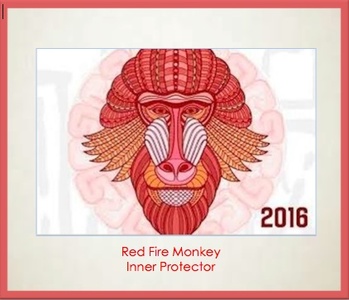
Last year of 2015 was the Chinese year of the Wood Sheep (Ram) where new possibilities, hopes and dreams were gestating. It was also a time of cleansing, releasing and facing difficult truths in order to form new patterns of connection. As you enter the Red Fire Monkey on Feb. 8, 2016, you step into a fresh opening where new aspects of yourself are birthing and developing a healthier connection to yourself and others.
Monkeys are inquisitive, quick, adaptable, intelligent, inventive and versatile; monkeys always keep you on your toes. It will be an adventurous fiery year of unpredictability. Monkeys are known to hop from one activity to another, so it is wise to observe what you really care about and what brings you and others love, joy and connection. There will be plenty of creative opportunities opening up. The key is to walk into the year with compassion for your vulnerabilities as well as your abilities...
You have an Inner Protector that ingeniously uses every tactic to keep you safe; it is capricious, adaptive, shrewd and inventive, just like a monkey. It does an impressive job of defending your values, keeping you from feeling pain and sequestering your emotions and vulnerabilities. At times is does such an artful job of protecting you that it recklessly creates a lot of chaos and impulsively destroys your most cherished relationships. It certainly knows how to keep others away. What you would appreciate is protection with connection. Through presence and understanding your fiery Inner Monkey Protector can help you navigate the sketchy harmful aspects of life while staying connected to what truly nourishes you.
Through presence and understanding your fiery Inner Monkey Protector can help you navigate the sketchy harmful aspects of life while staying connected to what truly nourishes you.
Loss of Connection
Loss is one of the most difficult feelings to bare and accept with open presence. Being present with loss shows you what nourishes you. Recently, you may have felt a loss of connection to someone, some part of yourself or a part of your life that gave you meaning, purpose, love and vitality. You may have experienced grief with the loss of people you loved or admired. You may have shed a part of yourself or a part of your life that had served you well. You may have experienced sadness, guilt, shame or regret about parts of your life that brought you or those you loved pain and disconnection. It is not easy to let go of loving relationships, a role you cherished, an identity and way of life, what you know and what has become comfortable. It is not easy to face the trauma of painful times in your life when you have felt lost, alone, abandoned, disconnected or unloved. Inwardly, the loss of connection may mirror a disconnected part of you. Realizing how disconnected you feel or the sense of never being connected to others is painful. Facing the truth of your experiences is freeing. It is the only way to let go, to make new choices, go in a new direction and create connection.
A Time of Cleansing
The experience of loss of connection requires a re-integration and re-formation of how you have previously experienced yourself and the reality. While you are in the midst of it, you may feel overwhelmed, anxious, numb, confused, disoriented or have an inability to cope with ‘normal’ daily life. You may experience a wide range of emotions from emptiness and sadness to wanting answers or feeling anger. It is normal to feel ‘strange’ and ungrounded as you find a new equilibrium. The experience of transition and integration is a sacred passage and offers the opportunity to awaken gifts and strengths you had not realized in yourself.
Cleansing the emotional body of loss and regrets is healing. In order to move into this year of opening into greater love and connection with yourself, you are given the opportunity to connect with disowned parts of yourself. Grace, time and spaciousness offer the gift of freeing you from beliefs and old stories that disconnect you from who you truly are.
Being Present with Your Inner Protector
Everyone has an Inner Protector. It is a part of your psyche that keeps you safe from danger, abuse and from feeling painful emotions and experiences. Your Inner Protector may be very strong and robust if you have experienced considerable loss, pain, trauma or abuse in your life. It is natural to protect yourself. The Inner Protector will react quickly to defend or attack when similarities with past experiences arise. Some experiences warrant a strong boundary. Some do not. Unfortunately, continually pushing away unpleasant discordant experiences or painful emotions does not bring lasting peace nor does it allow connection with yourself and others. Your Inner Protector may be overly reactive causing you more harm than good. It is important to reflect and become aware of what the Inner Protector is protecting.
Along with protecting you from others, it is likely that the Inner Protector is protecting you from parts of yourself that you find nasty, shameful, vulnerable or disagreeable. Emotions, reactions and behaviors are pushed away, denied, and self-righteously defended or dissociated from. None of those approaches work to quell debased feelings or the defensiveness of the Inner Protector. Its defenses come from a primal level of survival with limited knowledge. Befriending, understanding and redirecting the Inner Protector toward healthy responses establishes its supporting rather than dominating role. You make peace by honoring and appreciating how it serves to keep you safe. Be observant of all of the ways it protects you and also the ways in which it disconnects you. You get to choose and alter how it responds.
Take time to reflect and ask your fiery protector these questions.
- In what ways does my Inner Protector keep me safe? Healthy boundaries are important. You do not need to subject yourself to abusive relationships or danger in any form.
- How does my Inner Protector react when I am feeling unsafe? Do I withdraw, sulk, hide, get irritated, get angry, yell, lash out, or do I verbally or physically attack others or myself?
- How do these reactions help to keep me safe?
- How do these reactions disconnect me from others?
- In what ways are these reactions hurting me?
- In what ways does the Inner Protector stop me from expressing myself or from experiencing my life?
- Do I view people, life and the universe as friendly or hostile?
- Am I protecting myself from feeling sad, angry, lonely, empty, or any other emotion? Am I willing to be present to my emotions and love every part of my being?
When you are fully present to the experience you are having and allowing yourself to feel the physical sensations and emotions happening in your body something magical begins to occur; you experience Compassion.
Rest, disengagement and withdrawal from life in times of grief, loss, despair and when you are feeling lost or abandoned is natural and required to regain balance. It may feel uncomfortable at first to be present to the sensations and emotions. Your Inner Protector may flare up with dire warnings that you will be hurt. Take time to acknowledge your Inner Protector. When you are fully present to the experience you are having and allowing yourself to feel the physical sensations and emotions happening in your body something magical begins to occur; you experience compassion. The act of Being fully present is an act of Compassion. It is Love. Compassion naturally arises when you are not pushing your experience away, denying it, disengaging from it, or trying to eliminate it. As you experience compassion it opens and expands your awareness into spacious relaxation and harmony; your Inner Protector can take a break.
When you are willing to be with every part of your being and realize each part of you has a purpose, you are consciously loving yourself. Being present to your inner world through awareness is compassionate caring. Sensing disharmony through presence with your emotions and physical sensations allows you to transform the reactive behaviors that disconnect you into ones that bring harmonious tranquility and connection.


 RSS Feed
RSS Feed